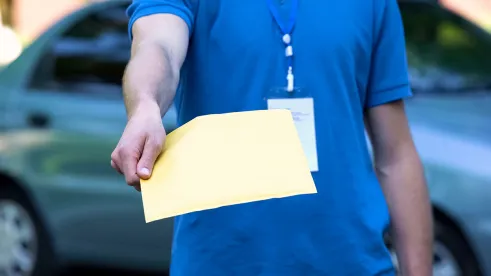Serving a district court complaint for patent infringement on a foreign defendant usually requires compliance with the Hague Convention on Service. A recent Federal Circuit decision, however, endorses alternative options under Federal Rule 4(f)(3) that could significantly simplify the process for plaintiffs and make it more difficult for foreign defendants to avoid service and delay participation in patent litigation in the United States.
For the first time in more than a decade, the Federal Circuit addressed service of process under Federal Rule 4(f)(3) in its decision issued in In re: Oneplus Technology (Shenzhen) Co., Ltd. In the underlying district court action, WSOU Investments LLC d/b/a Brazos Licensing and Development (“Brazos”) sued OnePlus, a Chinese entity with no place of business or employees anywhere in the United States, for patent infringement in the Western District of Texas. Rather than first attempting service of OnePlus in China under the Hague Convention, Brazos instead sought leave under Federal Rule 4(f)(3) to use alternative means of service – service on attorneys who had represented OnePlus in the past and on OnePlus’ authorized agent for service in Hayward, California. Federal Rule 4(f)(3) authorizes a court to “fashion means of service on an individual in a foreign country, so long as the ordered means of service (1) is not prohibited by international agreement; and (2) comports with constitutional notions of due process.”
The district court granted Brazos’ motion and OnePlus made a special appearance to challenge the sufficiency of service and personal jurisdiction, which the district court denied. OnePlus then sought a writ of mandamus — an exceptional remedy only granted if the right at issue is ‘clear and indisputable’ — from the Federal Circuit compelling the district court to vacate its order authorizing alternative service.
On review, the Federal Circuit denied OnePlus’ request for the writ of mandamus, evaluated the issues, and allowed service to proceed by the alternative means. In reaching its decision, the Federal Circuit dismissed OnePlus’ argument that to be subject to personal jurisdiction under the Texas long-arm statute, it also had to be served in accordance with the Texas long-arm statute, which would have required it to be served under the Hague Convention. The court noted that its 2010 decision in Nuance Communications, Inc. v. Abbyy Software House made clear that OnePlus’ argument “confuse[d] service of process under Rule 4(f)(3), which provides for court-directed service ‘by any means not prohibited by international agreement,’ with service under Rule 4(e)(1), which does not require a court-order and provides for service by ‘following state law.’”
The court also easily set aside OnePlus’ argument that Federal Rule 4(f) only applied to permit a court to authorize alternative means of service abroad, and not alternative means within the United States, which Brazos was granted to serve OnePlus. That argument too, the Federal Circuit explained, was foreclosed by Nuance.
Finally, the Federal Circuit rejected OnePlus’ argument that the district court abused its discretion in authorizing alternative service where there had not been a prior attempt to serve OnePlus under the Hague Convention. In considering this argument, the Federal Circuit expressed concerns about allowing alternative means of service under Rule 4(f)(3) merely because service under the Hague Convention might be cumbersome, noting that Rule 4(f)(3) was not meant to displace other rules for service in every instance in which alternative means were simply more convenient. Nevertheless, the Federal Circuit held that service under Rule 4(f)(3) was not a last resort and did not require a showing of thwarted service under the Hague Convention before being authorized.
Takeaways
As noted by our colleagues in a blog post earlier this year, district courts are increasingly more inclined to allow alternative means of service under Rule 4(f)(3). In In re: Oneplus Technology (Shenzhen) Co., Ltd., the Federal Circuit endorsed this practice, making it easier for plaintiffs to serve foreign companies.
At the same time, foreign companies now have fewer options to avoid service and delay participation in patent litigation in the United States. Even though the Federal Circuit noted its decision did not preclude OnePlus from raising service arguments on appeal from a final judgment, waiting for a final judgment is not a practical solution to address issues associated with service of process.





 />i
/>i
